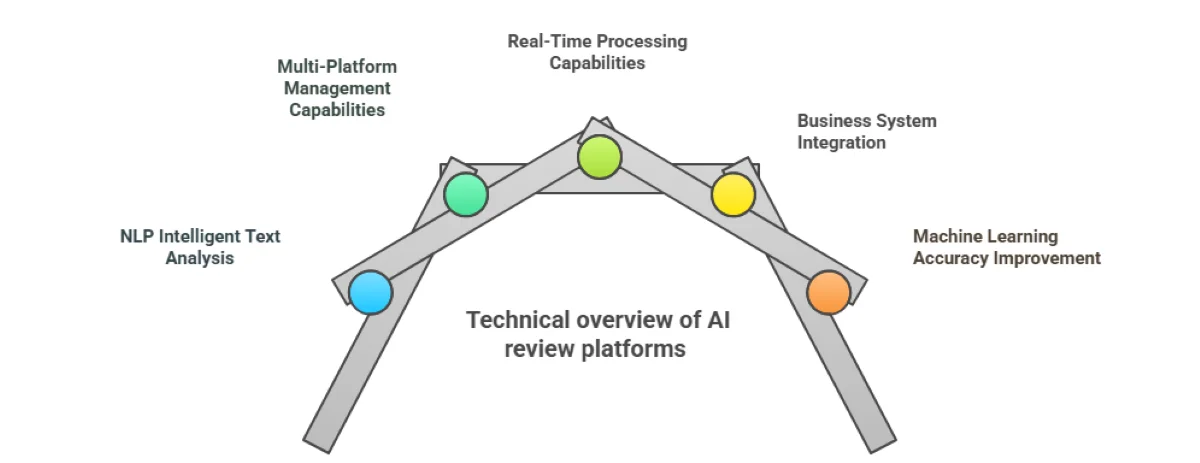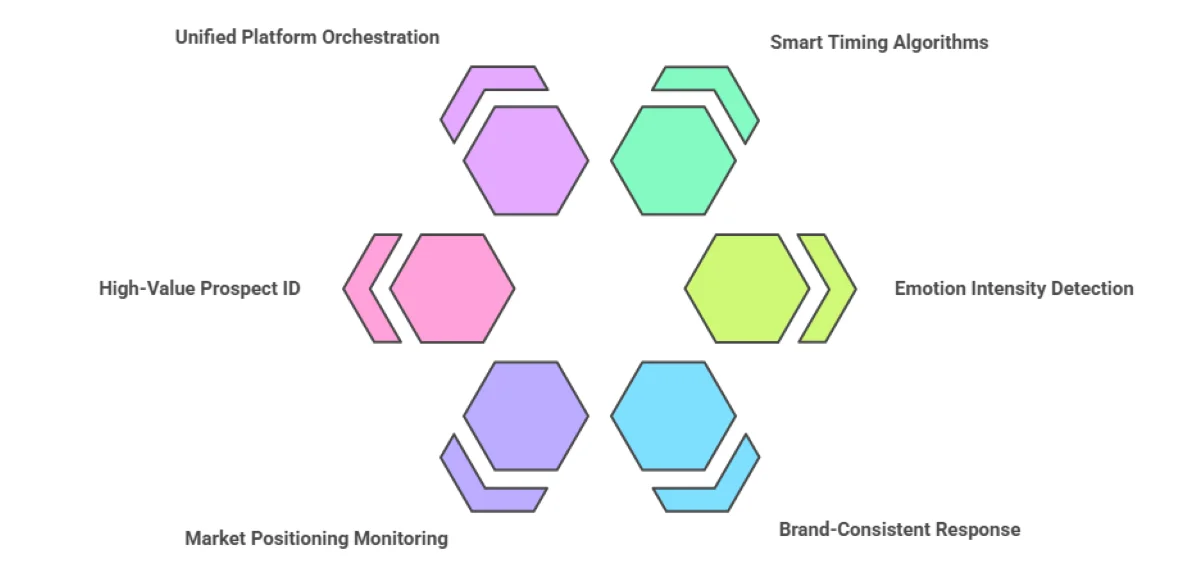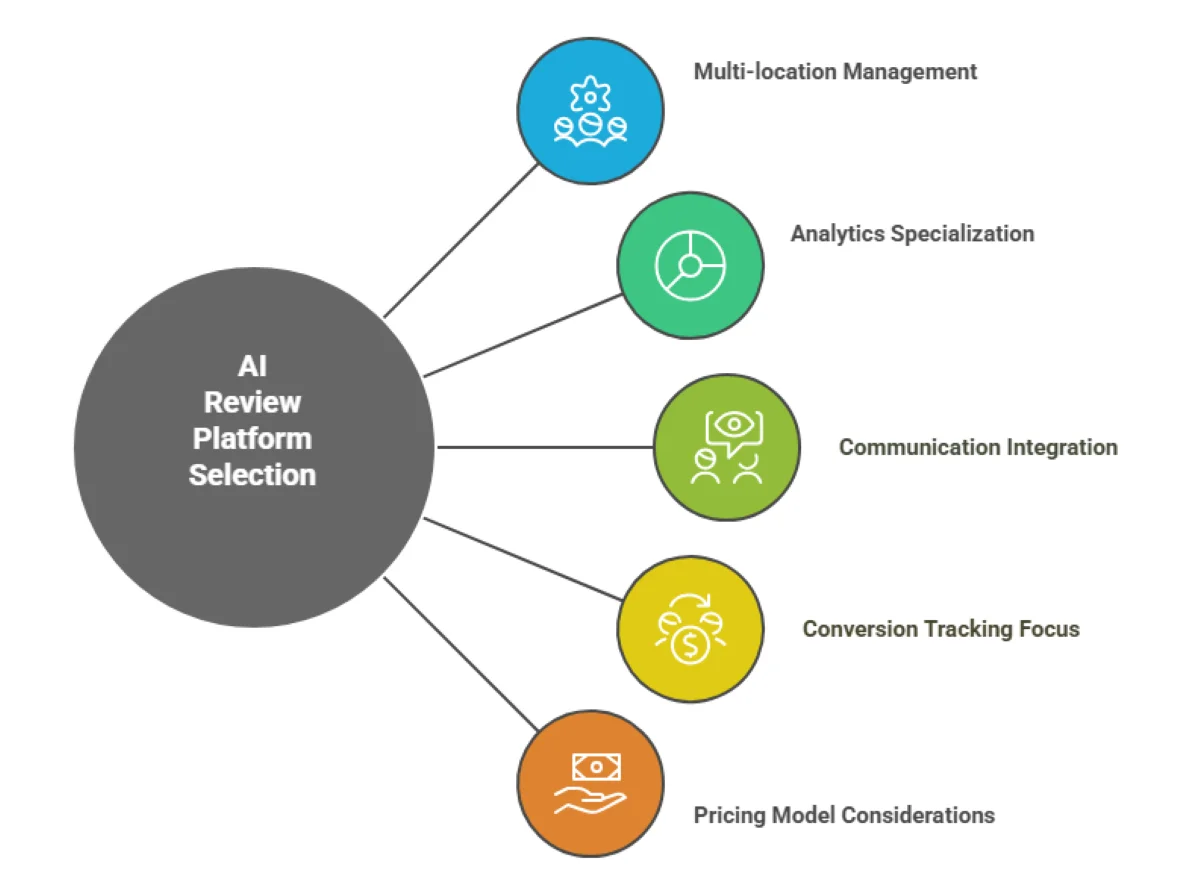
Local businesses now face a real challenge: customers make purchasing decisions based on online reviews more than ever before. When potential customers search for restaurants, plumbers, or dental practices, the first impression comes not from beautiful storefronts or years of experience, but from what previous customers shared about their experiences. One negative review can send prospects to competitors, while authentic testimonials can transform businesses into neighborhood favorites. This is where AI review platforms for business by turning customer feedback into a powerful growth driver, helping owners build trust, attract more clients, and improve visibility.
The digital world has changed how consumers discover, evaluate, and choose local services. Research shows that most customers rely heavily on reviews to guide their purchasing decisions, making trust a critical element for success. AI review platforms for local businesses have become a powerful solution to transform this modern challenge into a competitive advantage that drives measurable growth and sustainable revenue increases for business owners.

AI review management survival essentials
AI review management transforms customer feedback into a competitive advantage through automated collection, intelligent analysis, sentiment tracking, and predictive modeling, making it essential for local business success in today’s digital economy.
Review-based decision dominance
Businesses with consistent positive reviews attract more customers, providing them with competitive advantages for growth acceleration. The COVID-19 pandemic has accelerated this trend, affecting all industries.
$13 trillion AI opportunity
McKinsey Global Institute research estimates AI technology could add $13 trillion to the global economy by 2030, presenting potential for local businesses to leverage intelligent automation for sustained competitive advantage.
Digital-first customer journey standard
Modern customers consistently research businesses online before visiting physical locations, making your digital reputation the primary driver of foot traffic, conversion rates, and revenue generation across all business sectors.
Review velocity impacts rankings
Google’s algorithm prioritizes businesses with consistent, recent customer reviews, making AI-powered automated review collection essential for improved visibility, discovery, and enhanced local search ranking performance.
Manual management scalability limits
Businesses receiving dozens of monthly customer reviews need automated AI systems to maintain consistent response quality, extract business insights, and efficiently manage workflows without overwhelming existing staff resources.
Technical overview of AI review platforms for Businesses

AI platforms automate review collection, advanced sentiment analysis, and intelligent response management across multiple digital channels using sophisticated machine learning algorithms, natural language processing, and predictive analytics technologies.
NLP intelligent text analysis
Machine learning algorithms accurately interpret customer sentiment, identify discussion topics, extract meaningful insights from unstructured review data automatically, and provide comprehensive analysis for strategic decision-making and operational improvements.
Multi-platform management capabilities
Advanced systems efficiently aggregate customer reviews from Google, Facebook, TripAdvisor, Yelp, and industry-specific platforms into one centralized location, eliminating the need for time-consuming manual monitoring across platforms.
Real-time processing capabilities
Systems continuously analyze customer reviews as they’re posted, automatically triggering customized workflows and immediately alerting management teams to urgent issues requiring attention and strategic response coordination.
Business system integration
Modern platforms connect with existing CRM software, marketing automation tools, customer service systems, and analytics dashboards for unified customer experience management across all touchpoints.
Machine learning accuracy improvement
Advanced models learn from historical customer data and user feedback patterns to continuously enhance sentiment analysis precision, response quality, and overall platform effectiveness over time.
Science of AI review analysis
AI transforms unstructured customer feedback into structured business intelligence through analytical processes, sentiment analysis, topic modeling, competitive intelligence gathering, and predictive behavioral modeling techniques for strategic decision-making.
Sentiment analysis depth
Modern tools detect language nuances and recognize emotion intensity levels, enabling more precise customer satisfaction measurement compared to traditional methods and basic categorization approaches.
Automatic topic modeling
Using advanced Latent Dirichlet Allocation (LDA) algorithms, AI systems automatically identify frequently discussed topics and emerging themes across large review datasets, revealing hidden patterns and insights.
Competitive intelligence insights
AI platforms compare sentiment analysis and topic discussions against industry rivals, helping businesses evaluate performance and identify strategic differentiation opportunities for market advantage.
Predictive behavior analytics
Machine learning models analyze historical review data to predict customer satisfaction trends, churn risk probabilities, lifetime value potential, and future behavioral patterns for strategic planning.
Automated workflow categorization
AI systems automatically route incoming customer reviews to appropriate teams based on sentiment analysis, topic identification, and urgency level assessment for efficient resolution processes and improved response times.
Real conversion impact real data
Industry studies demonstrate AI review platforms for businesses can deliver measurable conversion improvements, ROI increases, and revenue growth across various business types and industries.
Digital marketing maturity impact
Research demonstrates that businesses with advanced digital marketing practices report revenue increases of up to 20% across various business sectors and implementation approaches.
Restaurant revenue improvements
Service businesses report measurable increases in mobile orders following AI review platform implementation and optimized customer feedback management across all digital channels.
Multi-location results
Franchise operations and chain stores demonstrate conversion improvements across locations through centralized AI review management systems, standardized processes, and unified customer engagement strategies.
Six conversion mechanisms

AI platforms employ six automated mechanisms to transform customer feedback into measurable conversion improvements.
Smart timing algorithms
Identify optimal moments for review requests based on customer interaction patterns, purchase completion indicators, satisfaction signals, and behavioral data for maximum response rates.
Emotion intensity detection
AI algorithms accurately determine emotional tone and intensity levels, categorizing reviews as positive, negative, or neutral, enabling businesses to strategically prioritize response efforts and resource allocation.
Brand-consistent response generation
Creates personalized, on-brand replies that address individual customer concerns while maintaining authentic communication tone, brand voice, and consistent messaging across all review platforms and channels.
Market positioning monitoring
Continuously track competitor review trends, sentiment patterns, performance gaps, and market opportunities to identify competitive advantages and strategic differentiation opportunities for business growth.
High-value prospect identification
Machine learning algorithms analyze review behavior patterns to predict customer lifetime value, conversion probability, and engagement potential for targeted marketing efforts and resource optimization.
Unified platform orchestration
AI systems synchronize review responses, sentiment tracking, reputation metrics, and customer engagement across Google, Yelp, Facebook, TripAdvisor, and industry-specific platforms for comprehensive coverage.
Successful review platform implementation guide
Successful review platform implementation requires structured planning phases, proper system integration, comprehensive data consolidation, ongoing performance optimization, and continuous monitoring to maximize conversion improvements and achieve sustainable ROI.
Platform selection planning
Evaluate business requirements, review volume capacity, existing technology stack compatibility, and budget constraints to select an optimal AI review management solution for long-term success and scalability.
Data consolidation training
Aggregate historical review data from all platforms, configure sentiment analysis parameters accurately, and train AI models on industry-specific terminology for precise analysis and optimal performance.
Automated workflow establishment
Configure review request triggers, response templates, escalation rules, and integration connections with CRM and marketing automation systems for operation and efficient workflow management across all channels.
Performance monitoring optimization
Establish comprehensive KPI dashboards, conversion tracking systems, and regular analysis cycles to continuously improve AI model accuracy, effectiveness, and overall platform performance over time.
Integration challenge solutions
API limitations, platform-specific formatting requirements, and real-time update delays require technical expertise and ongoing maintenance for optimal performance, reliability, and operation across all systems.
Maximizing business impact with AI-driven review analytics

Measuring the effectiveness of AI review platforms for businesses requires comprehensive analytics frameworks, attribution modeling systems, and performance tracking methodologies that accurately link review management activities to measurable business conversions and revenue growth.
Baseline metric establishment
Implement before-and-after analysis comparing review response rates, customer acquisition costs, and conversion percentages across multiple customer touchpoints for accurate measurement and performance evaluation.
Conversion event attribution
Advanced tracking systems link review interactions to phone calls, website visits, appointment bookings, and purchase completions for accurate ROI calculation, analysis, and strategic decision-making.
Long-term value quantification
AI platforms track how improved review management affects customer retention rates, repeat purchases, referral generation, and long-term value creation for comprehensive assessment and strategic planning.
Acquisition cost improvements
Compare marketing costs before and after AI implementation to quantify savings from improved conversion rates, reduced manual effort, and enhanced efficiency across all customer acquisition channels.
SEO ranking correlations
Monitor search position changes, click-through rates, local pack appearances, and organic traffic growth to measure AI review platform impact on discovery, visibility, and revenue generation.
Best practices for implementation
By implementing proven optimization strategies, businesses can ensure that AI review platforms not only deliver measurable conversion improvements but also foster authentic customer relationships and protect brand reputation, and drive sustainable long-term growth and success.
Brand voice consistency
Configure response templates that accurately reflect company values, tone, personality, and messaging. While addressing specific customer concerns across all review platforms for businesses.
Personalized timing optimization
Use customer behavior data to determine optimal request timing, preferred communication channels, and personalized message content for maximum response rates, engagement, and conversion success.
Damage control strategies
AI-powered review analysis provides competitive intelligence, comparing sentiment and topics against industry rivals to address issues proactively, strategically, and with maximum effectiveness for reputation protection.
Funnel integration optimization
Connect review displays with landing pages, call tracking systems, appointment booking platforms, and customer service tools for customer experience and improved conversion pathway optimization.
Authentic encouragement tactics
Focus on genuine customer satisfaction improvements and natural review generation rather than artificial review solicitation, incentive programs, or manipulative tactics that compromise authenticity and trust.
Seamless integration of advanced review management capabilities
Modern review management capabilities expand beyond basic sentiment analysis to include customer behavior prediction, omnichannel integration, voice analysis, and verification systems for comprehensive reputation management.
Voice feedback processing
AI systems transcribe and analyze spoken reviews from phone calls, voicemails, and video testimonials for comprehensive feedback collection, analysis, and insights across all communication channels.
Visual insight extraction
Computer vision technology analyzes images in customer reviews to identify product quality issues, service problems, positive experience indicators, and visual feedback for a comprehensive understanding.
Advertising performance optimization
AI review data enhances Google Local Services Ad targeting, bidding strategies, lead qualification processes, and campaign optimization for improved advertising ROI and conversion rates.
Incentive structure optimization
Machine learning algorithms identify optimal incentive structures that encourage genuine customer reviews without compromising authenticity, violating platform policies, or damaging brand reputation and trust.
Authentication systems
Advanced platforms implement verification technology to authenticate reviewer identity and prevent manipulation while maintaining customer privacy, data security, and platform integrity.
How to select the best AI review platform for maximum roi

Choosing the optimal AI review platform requires careful evaluation of advanced features, competitive pricing models, integration capabilities, scalability options, and long-term support to match specific business requirements effectively.
Multi-location management
Enterprise-grade platforms excel at managing multiple locations with several features, particularly suitable for businesses requiring advanced features and detailed reporting systems.
Analytics specialization
Advanced sentiment analysis and competitive intelligence features suit businesses requiring deep review insights, market analysis capabilities, and detailed performance reporting systems.
Communication integration
Platforms that excel at converting inbound leads into conversations through messaging but may lack advanced reputation insights, listings management, or robust multi-location support for complex business needs.
Conversion tracking focus
Strong analytics capabilities and conversion attribution modeling make platforms ideal for businesses prioritizing measurable results, performance optimization, and ROI tracking across all channels and touchpoints.
Pricing model considerations
Consider per-location fees, review volume limitations, feature tiers, implementation costs, and ongoing support when evaluating the total cost of ownership and expected ROI for informed decision-making.
How Spreadical can help with AI Google reviews management?
Spreadical transforms Google review management through intelligent automation, real-time synchronization, and AI-powered response generation, assisting local businesses in maintaining a professional online presence effortlessly.
Instant Google review sync
New Google reviews appear automatically in real time without requiring manual monitoring through Spreadical’s system. This allows business owners to stay informed about customer feedback while focusing on daily operations.
AI-smart reply drafts
AI-generated response suggestions align with business tone and address specific customer concerns. These drafts serve as starting points for authentic communication that maintains professional standards.
Continuous improvement through feedback
The system adapts based on user input over time, refining response suggestions to better match individual business communication styles through Spreadical’s machine learning capabilities.
WhatsApp-based review management
Review management becomes accessible through WhatsApp with Spreadical, allowing business owners to handle responses, approvals, and edits using familiar mobile messaging without switching between multiple applications.
Cloud-based data management
All Google reviews and response history are stored in a secure cloud infrastructure, making past conversations searchable and ensuring no important customer interactions are lost through Spreadical’s platform.
Frequently asked questions
1. What is an AI review platform, and how does it work?
An AI review platform is a sophisticated software solution that uses artificial intelligence to automatically collect, analyze, and manage customer reviews across multiple online platforms. It works by monitoring review sites like Google, Yelp, and Facebook, then using natural language processing to understand sentiment and automatically generate appropriate responses. T
2. How does Google AI analyze customer reviews for businesses?
Google uses machine learning algorithms to analyze various factors in customer reviews, including sentiment, relevance, recency, and authenticity. The AI evaluates review patterns, language quality, reviewer history, and engagement metrics to determine which reviews have the most impact on local search rankings.
3. Can AI review platforms really improve local business conversions?
Yes, AI review platforms can significantly improve conversions by automating review requests at optimal times, generating personalized responses that build trust, and identifying high-value prospects through behavior analysis. Industry studies show that businesses with advanced digital marketing practices, including AI-powered review management, can see revenue increases of up to 20%.
4. What are the best AI-powered review management tools in 2025?
The leading AI review management platforms include enterprise-grade solutions that excel at multi-location management, specialized analytics platforms focused on sentiment analysis and competitive intelligence, communication-focused tools that convert leads through messaging, and conversion-tracking platforms that provide comprehensive ROI measurement.
5. How do AI-generated review responses affect customer trust?
AI-generated review responses can enhance customer trust when properly implemented, as they ensure consistent, timely, and professional communication. The key is training the AI system on your brand voice and maintaining human oversight for quality control. Studies show that 89% of consumers are more likely to choose businesses that respond to all reviews.
6. Does using AI review platforms improve local SEO rankings?
Yes, AI review platforms can significantly improve local SEO rankings by increasing review velocity, improving response rates, and enhancing overall review quality. Review signals account for approximately 13% of Google’s local ranking factors. AI platforms help businesses maintain consistent positive reviews, respond promptly to feedback, and optimize their online presence across multiple platforms, all of which contribute to better local search visibility.
7. How do small businesses benefit from AI review automation?
Small businesses benefit from AI review automation by saving time on manual review monitoring, ensuring consistent response quality without dedicated staff, identifying customer satisfaction trends early, and competing more effectively with larger businesses. AI automation allows small business owners to focus on core operations while maintaining a professional online presence, generating more reviews, and improving customer relationships through timely, personalized responses.
8. Are AI review platforms cost-effective for local businesses?
AI review platforms are generally cost-effective for local businesses, especially when considering the time savings, increased review generation, improved conversion rates, and reduced customer acquisition costs. Most platforms offer scalable pricing based on location count and features needed.
9. How do AI tools prevent or detect fake reviews?
AI tools detect fake reviews by analyzing multiple factors, including reviewer behavior patterns, linguistic fingerprints, posting frequency, account history, and review content quality. Machine learning algorithms can identify coordinated review campaigns, unusual activity patterns, and suspicious reviewer profiles.
10. What’s the future of Google AI in local business review management?
The future of Google AI in review management includes more sophisticated sentiment analysis, personalized review displays based on searcher intent, enhanced fake review detection, integration with voice search and smart assistants, and predictive analytics for business performance.


